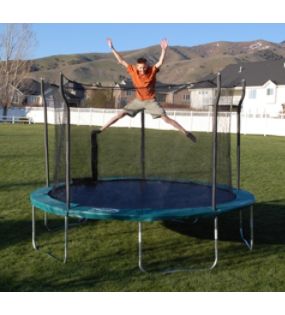 Trampolines help your kids burn off excess energy, and they’re a great weight loss tool for you. However, the American Academy of Pediatrics recommends that all consumers avoid using trampolines because unsafe use of this backyard toy can cause head and neck injuries, fractures and sprain. As a homeowner, don’t set up a backyard trampoline until you find out more about your liability.
Trampolines help your kids burn off excess energy, and they’re a great weight loss tool for you. However, the American Academy of Pediatrics recommends that all consumers avoid using trampolines because unsafe use of this backyard toy can cause head and neck injuries, fractures and sprain. As a homeowner, don’t set up a backyard trampoline until you find out more about your liability.
Check Your Homeowners Insurance Policy
Trampolines are fun, but the expenses could quickly outweigh any enjoyment. Some insurance companies will not insure your home if you have a trampoline. They may either cancel your policy or exclude coverage for any trampoline-related injuries. Either way, you’ll be personally liable for any injuries that occur.
Set It Up Properly
If your homeowners insurance policy does cover your trampoline, be sure you set it up properly as you increase its safe operation.
*Follow the manufacturer’s instructions when setting up and using the trampoline.
*If possible, place the trampoline at ground level rather than above ground.
*Remove tree branches and other hazards located nearby.
*Provide adequate padding on the springs as you prevent pinching.
*Secure a safety net around the trampoline.
*Inspect the trampoline and all its parts regularly for wear and tear.
Provide Constant Supervision
Guests who are injured while using your trampoline can sue you. Be sure you provide constant supervision to ensure everyone practices safe jumping. That means only one person at a time should jump, and no one should do somersaults or flips, two major causes of spine injuries.
Fence-In Your Yard
You’re liable for injuries that occur by anyone who uses your trampoline, even if the jumper doesn’t have your permission or trespasses in your lawn. Protect yourself with a tall fence. It should have a self-latching lock on the gate for greater security.
Your family and friends can enjoy fun in your backyard thanks to your trampoline. Be sure to understand your liability, though, before you install one.
Read more
 Trampolines help your kids burn off excess energy, and they’re a great weight loss tool for you. However, the American Academy of Pediatrics recommends that all consumers avoid using trampolines because unsafe use of this backyard toy can cause head and neck injuries, fractures and sprain. As a homeowner, don’t set up a backyard trampoline until you find out more about your liability.
Trampolines help your kids burn off excess energy, and they’re a great weight loss tool for you. However, the American Academy of Pediatrics recommends that all consumers avoid using trampolines because unsafe use of this backyard toy can cause head and neck injuries, fractures and sprain. As a homeowner, don’t set up a backyard trampoline until you find out more about your liability.
Check Your Homeowners Insurance Policy
Trampolines are fun, but the expenses could quickly outweigh any enjoyment. Some insurance companies will not insure your home if you have a trampoline. They may either cancel your policy or exclude coverage for any trampoline-related injuries. Either way, you’ll be personally liable for any injuries that occur.
Set It Up Properly
If your homeowners insurance policy does cover your trampoline, be sure you set it up properly as you increase its safe operation.
*Follow the manufacturer’s instructions when setting up and using the trampoline.
*If possible, place the trampoline at ground level rather than above ground.
*Remove tree branches and other hazards located nearby.
*Provide adequate padding on the springs as you prevent pinching.
*Secure a safety net around the trampoline.
*Inspect the trampoline and all its parts regularly for wear and tear.
Provide Constant Supervision
Guests who are injured while using your trampoline can sue you. Be sure you provide constant supervision to ensure everyone practices safe jumping. That means only one person at a time should jump, and no one should do somersaults or flips, two major causes of spine injuries.
Fence-In Your Yard
You’re liable for injuries that occur by anyone who uses your trampoline, even if the jumper doesn’t have your permission or trespasses in your lawn. Protect yourself with a tall fence. It should have a self-latching lock on the gate for greater security.
Your family and friends can enjoy fun in your backyard thanks to your trampoline. Be sure to understand your liability, though, before you install one.
Read more
 Are you having a Super Bowl party – perhaps hoping to watch the 9ers win in Vegas this Sunday? What responsibilities do you have, though, if you serve alcohol?
Are you having a Super Bowl party – perhaps hoping to watch the 9ers win in Vegas this Sunday? What responsibilities do you have, though, if you serve alcohol?
You’re Responsible
If one of your guests drinks and injures someone or causes an accident during or after the party, you could be responsible thanks to social host laws that vary between states. Understand your state’s laws and be prepared to serve alcohol responsibly because your intoxicated guests’ actions could become your liability.
Protect Your Assets
Your home, bank accounts and paychecks are at risk if you’re found liable for an intoxicated guests’ actions. Lawsuits could run into the millions of dollars, especially if someone is seriously injured/killed. Protect your assets when you:
- Stay sober
- Limit drinks
- Don’t play drinking games
- Say no when someone’s had enough
- Designate a driver to take guests home, call a taxi or let guests crash at your house until they’re sober
Never Serve Alcohol to Minors
Every state and even municipalities within a state enforce different laws about serving alcohol to minors. However, you’ll stay on the right side of the law if you don’t serve alcohol to minors during your backyard parties or leave alcohol available during parties your kids might host when you’re not home. Doing so could get you fined or jailed.
All Home Insurance Policies are not Created Equal
Home insurance policies can include social hosting liability that you’ll need if you serve alcohol to party guests. Review your policy today and make sure it includes adequate social hosting liability coverage. If it doesn’t, discuss your options with your agent or shop around for a policy that will protect you and your assets.
Know the facts so that you can protect yourself and your guests. Be sure to review your homeowners insurance policy, too, as you maximize your coverage and prepare to have a fun and safe celebration.
Read more
 Whether you’re a hugger by nature or prefer not to be touched, your physical and mental health benefit when you celebrate National Hug Day, held annually on January 21. Give a few hugs this day and every day as you improve your overall health and wellbeing.
Whether you’re a hugger by nature or prefer not to be touched, your physical and mental health benefit when you celebrate National Hug Day, held annually on January 21. Give a few hugs this day and every day as you improve your overall health and wellbeing.
Increase Oxygen Flow
Touch increases your body’s hemoglobin, and it carries oxygen to all your body’s organs. With oxygen, your body’s able to fight diseases as it recovers from illness.
Reduce Physical Pain
UCLA Pain Control unit’s Dr. David Bresler see the need for physical touch. He prescribes bear hugs four times a day as part of his patients’ pain management treatment plan. To give and receive a bear hug and reduce your physical pain, he suggests you face your partner and use both of your arms to fully embrace him or her.
Improve Mental Health
Hugging releases oxytocin, an important hormone that affects your mental health and wellbeing. With it, you feel happier and less anxious.
Reduce Stress
A study performed at the University of North Carolina at Chapel Hill researched the responses of 50 people after a stressful event. Part of the group held hands and hugged for 20 seconds while the rest of the participants sat quietly and did not touch. When asked to recall a recent stressful event, the cuddlers experienced lower heart rates and blood pressure readings then the non-cuddlers. You, too, will enjoy reduced stress when you hug.
Sleep Better
Instead of fighting insomnia or relying on sleeping pills, participate in a few hugs every day. They relax your body and your emotions so that you can enjoy a better night’s sleep.
Live Longer
Hugging stimulates your skin’s nerve endings, which allows them to signal your brain to slow cortisol release. It’s a hormone that fights stress, builds your immune system, reduces inflammation and assists you in living longer.
Hugs do more than show affection. They also improve your physical and mental health. Implement them into your daily routine on National Hug Day, and talk to your doctor about additional ways you can be healthy and whole.
Read more

If your New Year’s resolution includes losing weight, stress and busyness at work can quickly put a wrench in your well-meaning plans. You need a few healthy snacks that satisfy hunger without sabotaging your resolution.
- Apples
Eat three crunchy and nutritious apples a day to lose weight. That’s because they’re loaded with fiber that helps you feel full. Whether you eat them whole or dip slices in peanut butter, you’ll want to carry at least one apple to work every day.
- Nuts
Enjoy a handful of nuts during snack time, and you’ll eat less during meal time. Almonds, walnuts, pecans and peanuts are all high in fiber, protein, unsaturated fats and other important vitamins. Plus, they’re easy to store in your desk or briefcase.
- Yogurt
Traditional or Greek yogurt stands out as a weight loss food. Pack your favorite flavor in a portable cooler to indulge in a calcium-rich snack at your desk.
- Eggs
Hard boiled eggs taste delicious alone or with a little salt or cheese. Store these protein-packed snacks in your portable cooler to enjoy when you’re feeling hungry.
- Tuna
Versatile tuna tastes delicious straight out of the can or bag, and it’s high in protein and omega-3. Stock tuna, a few crackers and a fork in your desk to enjoy the next time you feel hungry.
- Hummus
Made from chickpeas, hummus contains protein and no saturated fats. Spread it on vegetables or whole grain crackers for a healthy and delicious snack.
- Dark Chocolate
That’s right, dark chocolate features beneficial antioxidants and several nutrients like fiber, manganese, copper, iron and magnesium. A few squares satisfies your hunger and feels like a fun indulgence.
With these seven snacks, you eat your way to a healthier you. You also keep your New Year’s weight loss resolution. Talk to your doctor and health insurance company for more tips on how the right snacks help you stay healthy this year.
Read more
 Happy Holidays to you and yours from all of us here at Scurich Insurance Services. 🙂
Happy Holidays to you and yours from all of us here at Scurich Insurance Services. 🙂
Whether you received valuable collectibles or heirloom jewelry, you’ll want to insure these holiday presents. Your homeowners or renters insurance policy may provide coverage for some of your new items, but anything above the existing coverage limit requires a personal articles floater. Consider specific gifts that you’ll want to insure this year.
Jewelry: Your homeowners insurance policy should cover jewelry valued at less than $2,000. However, appraised jewelry that’s more valuable will require a floater.
Furs: From a real fur jacket to a fake fur-trimmed hat, add any furs you receive to your homeowners insurance policy.
Fine Art: Paintings, sculptures, rare books, manuscripts, ornamental collectibles, glasses and antique furniture fall under the fine art category. Record these items and their value on an itemized schedule attached to your insurance policy.
Electronics: Laptops, cameras, TVs and other electronic devices, plus telescopes, video recording equipment and films, are typically included in your existing homeowners or renters insurance policy. If these items are high-end, consider a floater.
Coins or Stamps: Depending on their value, you’ll want to add a floater for new coins or stamps in your collection.
Musical Instruments: List any musical instruments, including sound equipment, on a floater.
China, Crystal or Silverware: List these items on a schedule and include the insurance coverage amount.
Guns: List and describe each gun on a schedule. Include the value.
Sporting Goods: Bicycles, golf equipment, guns and other sporting goods fall under your existing insurance policy unless they’re collectible, rare or expensive.
Tools: Insured under your homeowners or renters policy, your new tools won’t need a floater unless they exceed the value of your existing coverage.
As with everything in your home inventory, record a detailed description, serial number, purchase date, value and picture of your new holiday presents. Store copies of this information with your insurance policy in a fireproof safe and in a secure location other than your home.
Go ahead and enjoy your new holiday presents. Just remember to check with your insurance agent to be sure they’re covered.
Read more
 Trampolines help your kids burn off excess energy, and they’re a great weight loss tool for you. However, the American Academy of Pediatrics recommends that all consumers avoid using trampolines because unsafe use of this backyard toy can cause head and neck injuries, fractures and sprain. As a homeowner, don’t set up a backyard trampoline until you find out more about your liability.
Trampolines help your kids burn off excess energy, and they’re a great weight loss tool for you. However, the American Academy of Pediatrics recommends that all consumers avoid using trampolines because unsafe use of this backyard toy can cause head and neck injuries, fractures and sprain. As a homeowner, don’t set up a backyard trampoline until you find out more about your liability.
 Are you having a Super Bowl party – perhaps hoping to watch the 9ers win in Vegas this Sunday? What responsibilities do you have, though, if you serve alcohol?
Are you having a Super Bowl party – perhaps hoping to watch the 9ers win in Vegas this Sunday? What responsibilities do you have, though, if you serve alcohol? Whether you’re a hugger by nature or prefer not to be touched, your physical and mental health benefit when you celebrate National Hug Day, held annually on January 21. Give a few hugs this day and every day as you improve your overall health and wellbeing.
Whether you’re a hugger by nature or prefer not to be touched, your physical and mental health benefit when you celebrate National Hug Day, held annually on January 21. Give a few hugs this day and every day as you improve your overall health and wellbeing.
 Happy Holidays to you and yours from all of us here at Scurich Insurance Services. 🙂
Happy Holidays to you and yours from all of us here at Scurich Insurance Services. 🙂